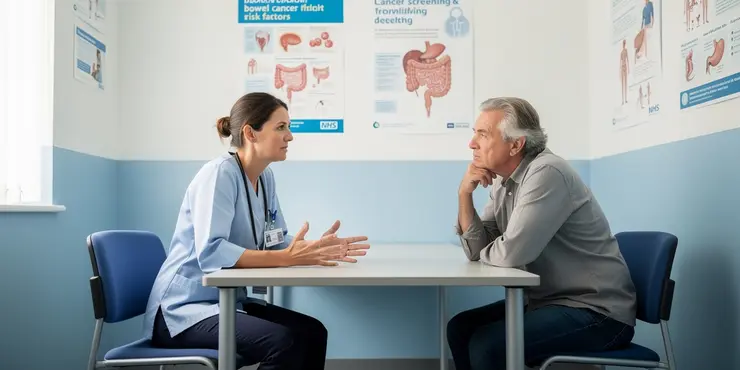
Find Help
More Items From Ergsy search
-
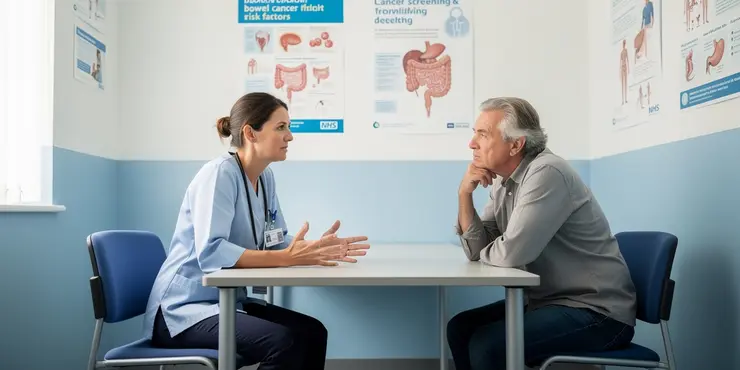
What are the risk factors for bowel cancer?
Relevance: 100%
-
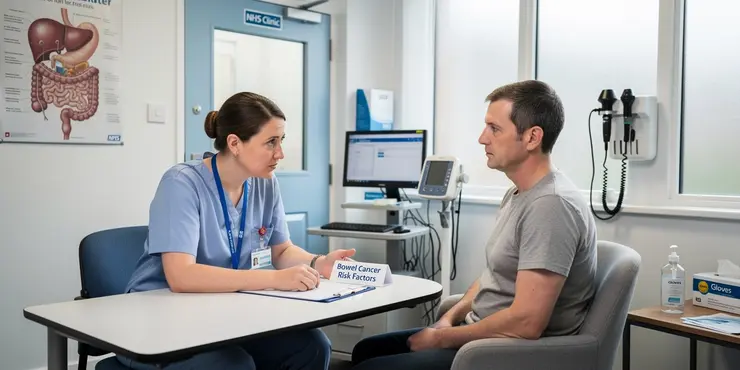
What factors are contributing to the increase in bowel cancer cases?
Relevance: 80%
-
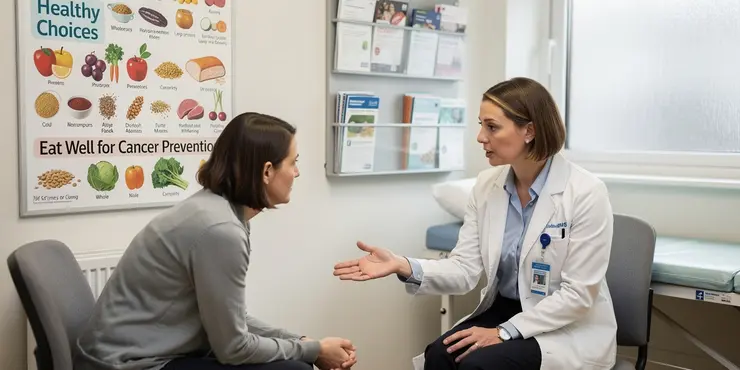
Can lifestyle changes help reduce bowel cancer risk?
Relevance: 73%
-
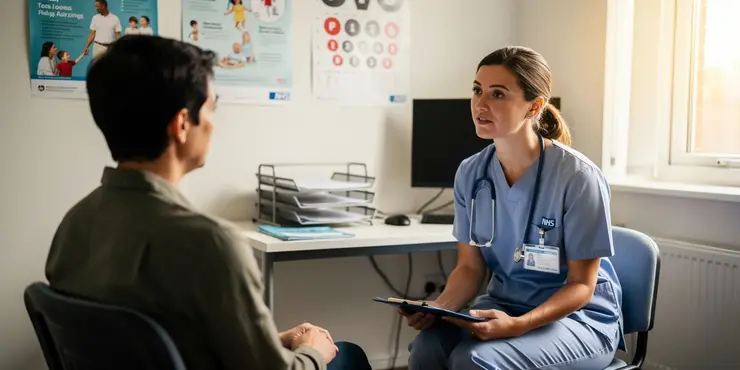
How does family history affect the risk of bowel cancer?
Relevance: 72%
-
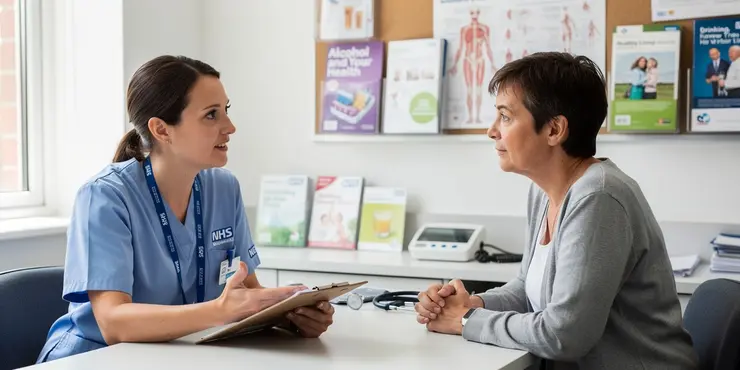
What role does alcohol consumption play in bowel cancer risk?
Relevance: 72%
-
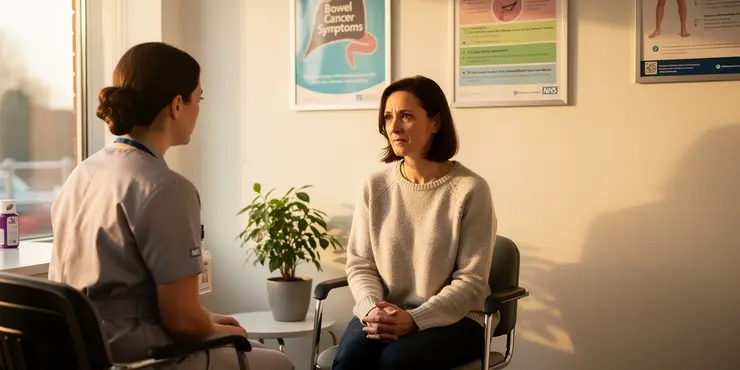
What is Bowel Cancer?
Relevance: 72%
-
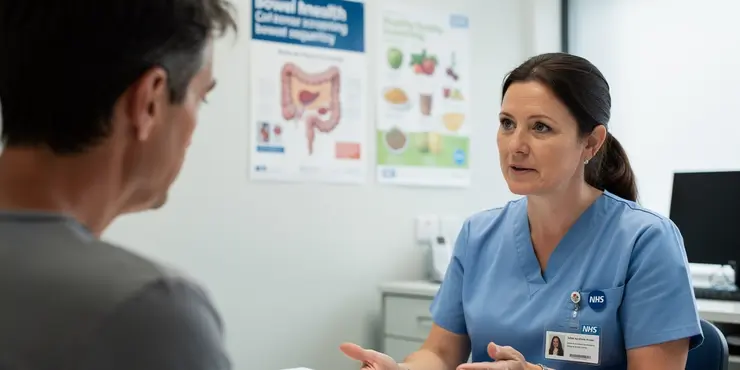
What role does diet play in the risk of developing bowel cancer?
Relevance: 71%
-
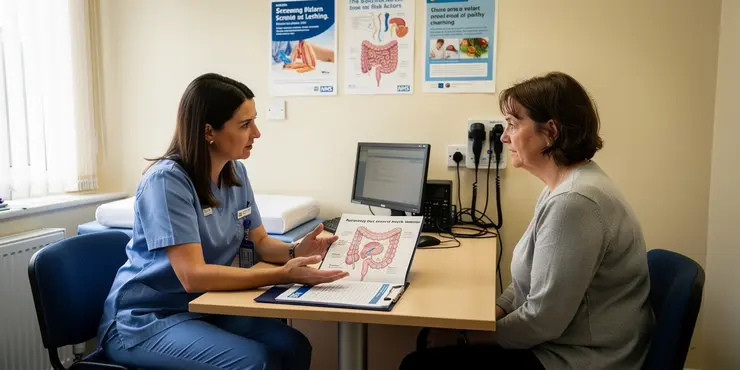
What factors increase my risk of colorectal cancer?
Relevance: 71%
-
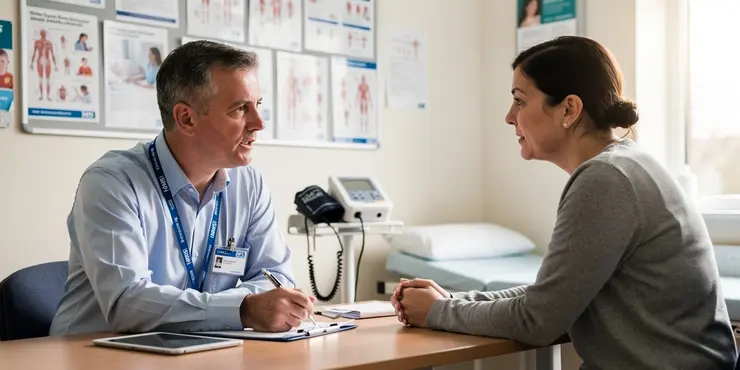
Why is there a surge in bowel cancer?
Relevance: 71%
-
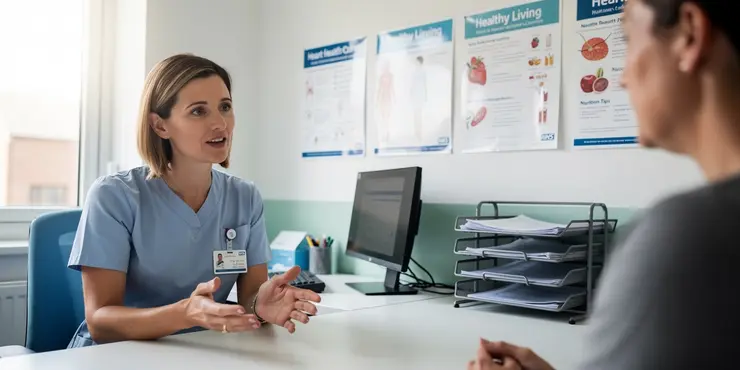
What lifestyle changes can help lower the risk of bowel cancer?
Relevance: 70%
-
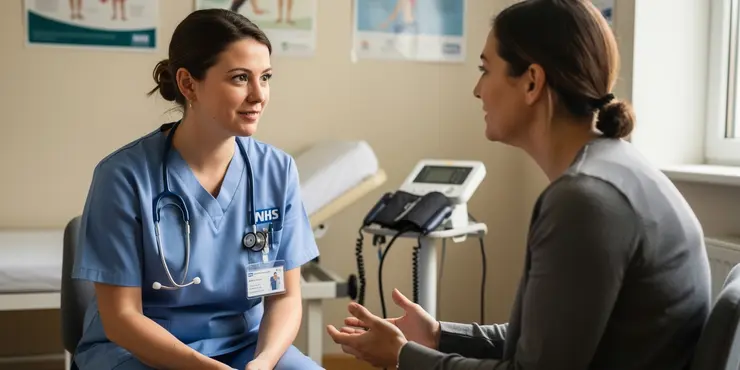
How common is bowel cancer?
Relevance: 69%
-
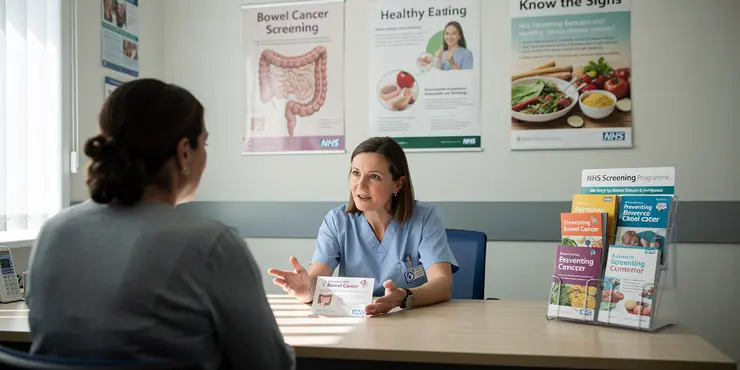
Can bowel cancer be prevented?
Relevance: 68%
-
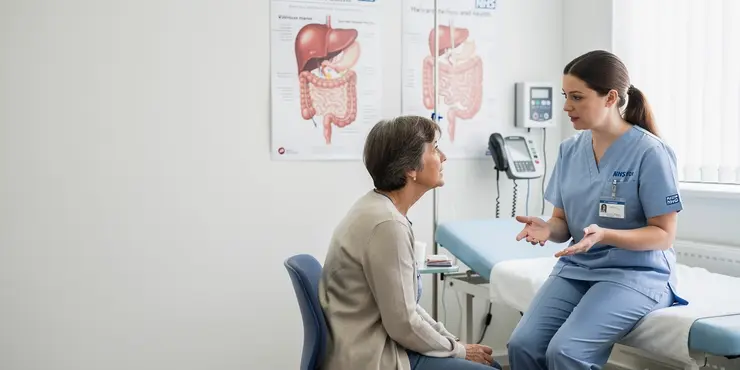
Is diet linked to the rise in bowel cancer?
Relevance: 68%
-
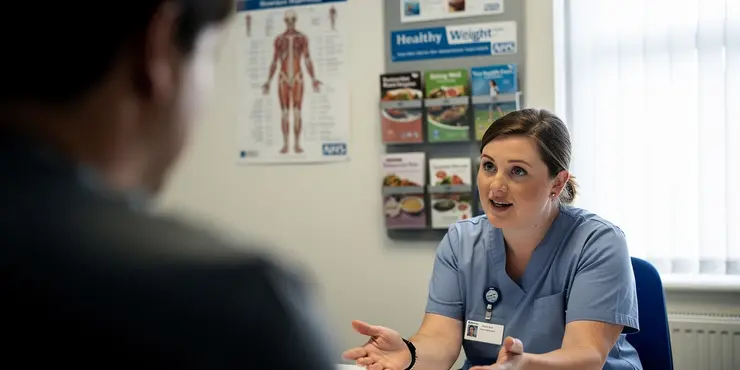
How does obesity affect bowel cancer rates?
Relevance: 65%
-
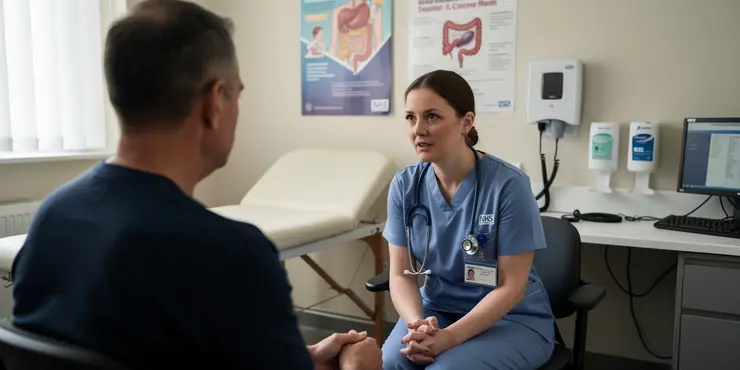
What is the survival rate for bowel cancer?
Relevance: 64%
-
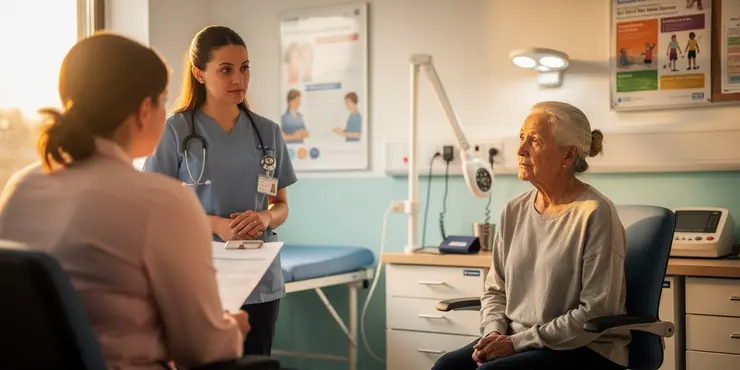
Bowel cancer - Symptoms and signs to look out for
Relevance: 63%
-
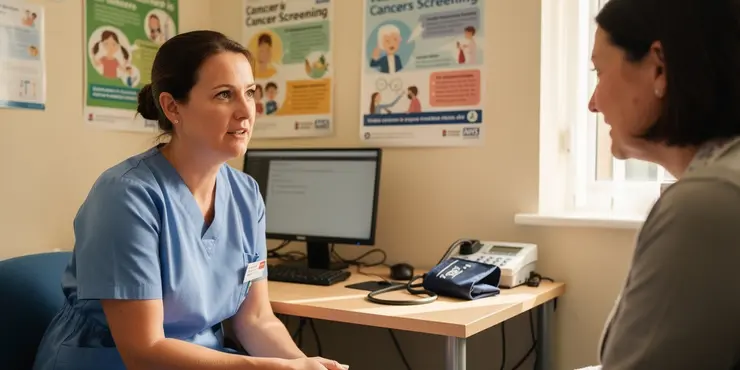
Are there any risk factors that increase the need for cancer screening?
Relevance: 63%
-
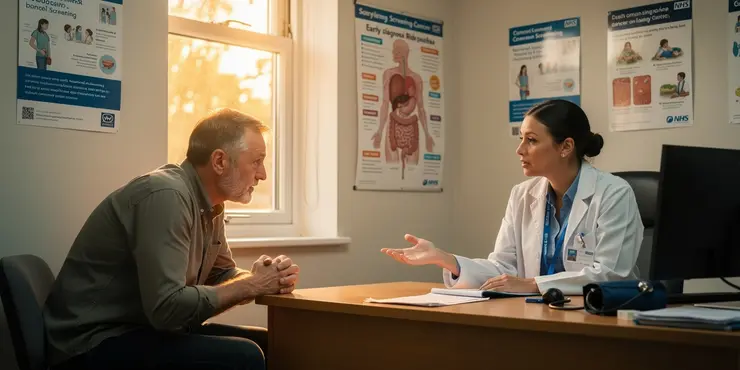
How is bowel cancer diagnosed?
Relevance: 63%
-
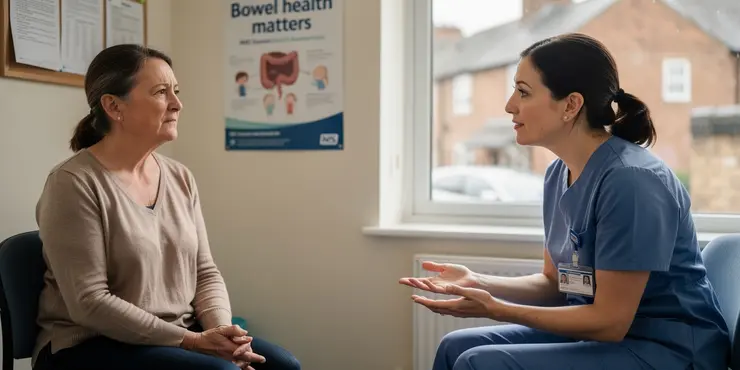
Can bowel cancer spread to other parts of the body?
Relevance: 61%
-
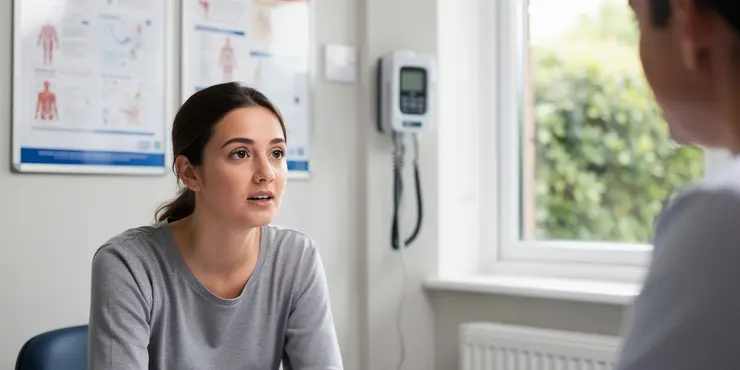
Are younger people being diagnosed with bowel cancer more frequently?
Relevance: 61%
-
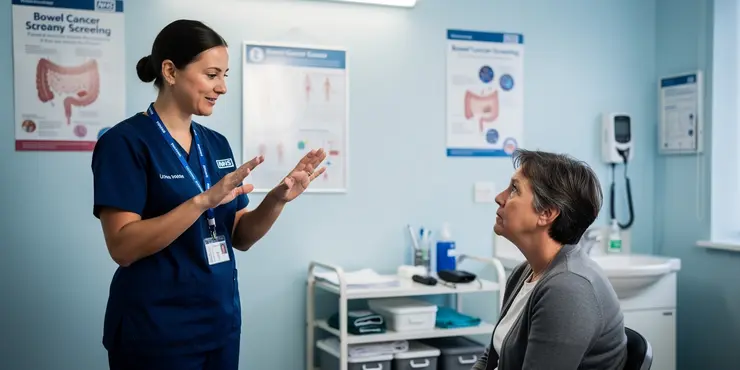
Learn about bowel cancer (British Sign Language version)
Relevance: 60%
-
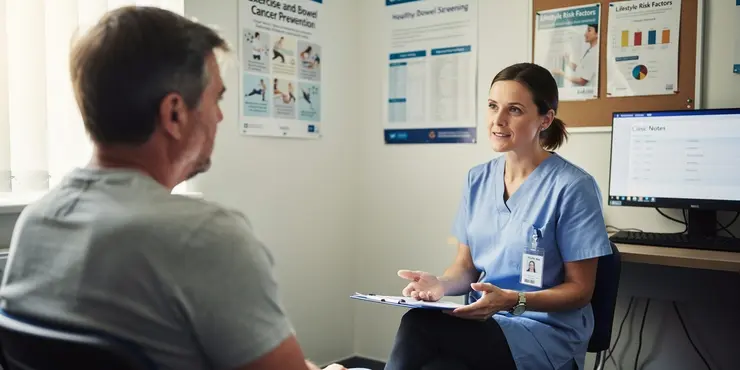
How does exercise impact bowel cancer progression?
Relevance: 60%
-
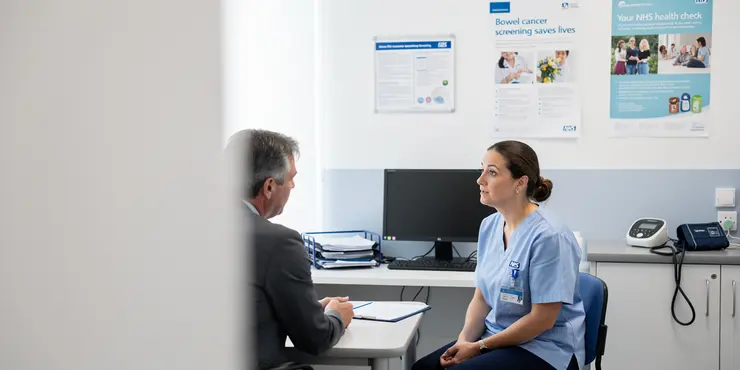
Taking a Genetic Family History - The Conversation (Bowel Cancer)
Relevance: 59%
-
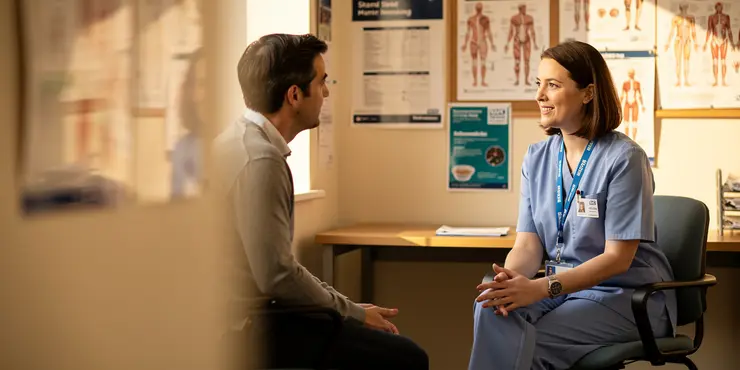
What treatment options are available for bowel cancer?
Relevance: 59%
-

Can exercise help slow down the progression of bowel cancer?
Relevance: 59%
-

Are there specific benefits of exercise for bowel cancer survivors?
Relevance: 59%
-
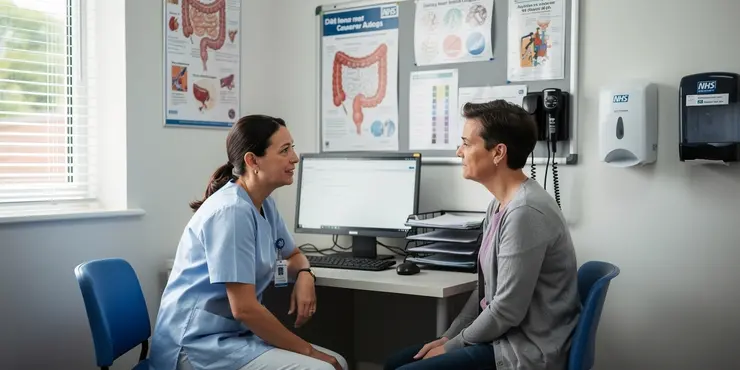
How is the stage of bowel cancer determined?
Relevance: 58%
-
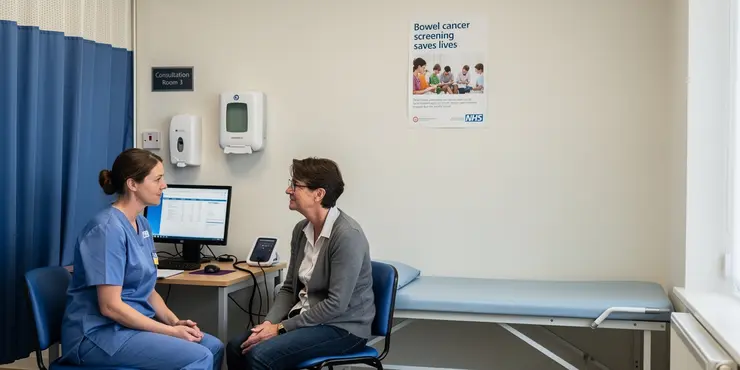
How does increased screening impact bowel cancer statistics?
Relevance: 56%
-
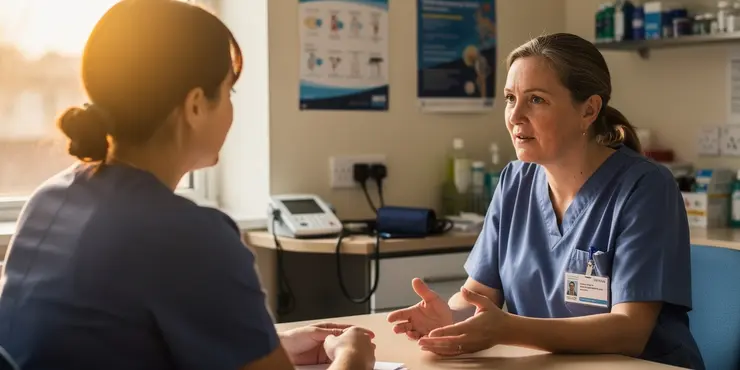
What are the side effects of bowel cancer treatment?
Relevance: 55%
-
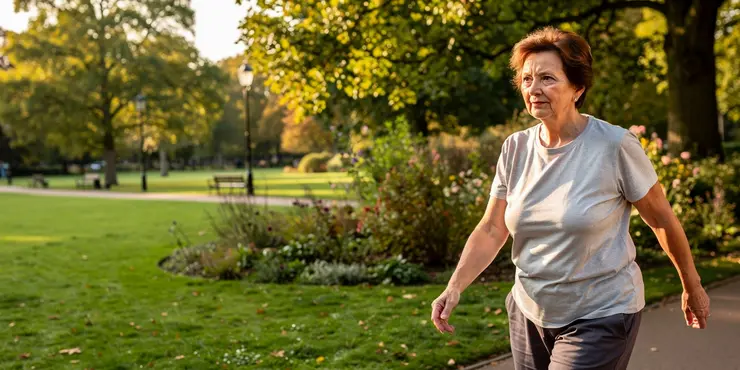
Can exercise help slow down the progression of bowel cancer?
Relevance: 55%
-
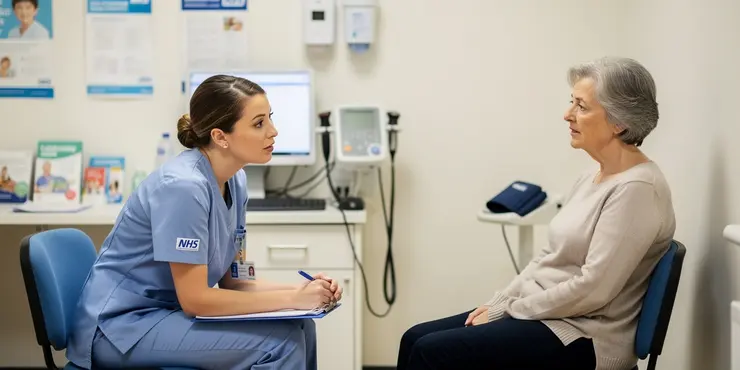
Bowel Cancer
Relevance: 54%
-
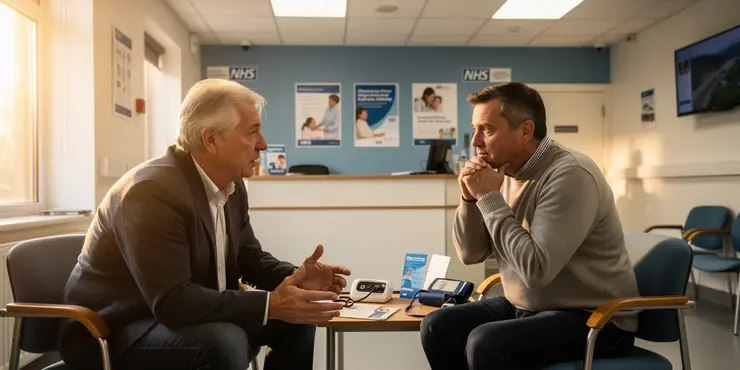
Bowel cancer screening: Alan Titchmarsh and Tommy Walsh | NHS
Relevance: 54%
-
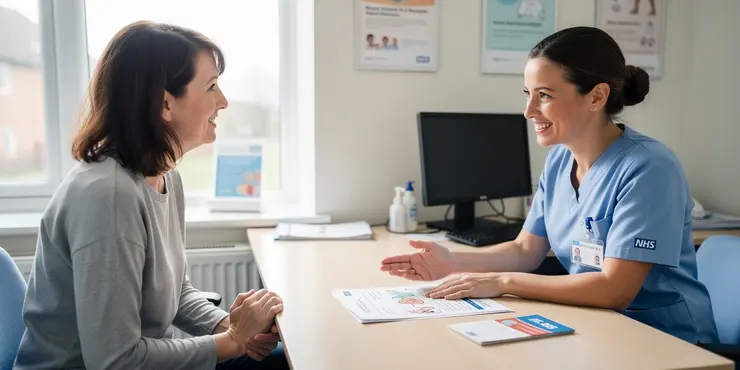
What support is available for individuals diagnosed with bowel cancer?
Relevance: 54%
-
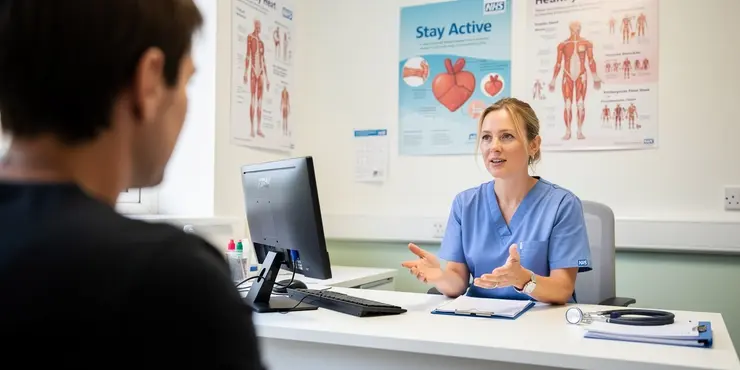
What types of exercise are beneficial for bowel cancer patients?
Relevance: 53%
-
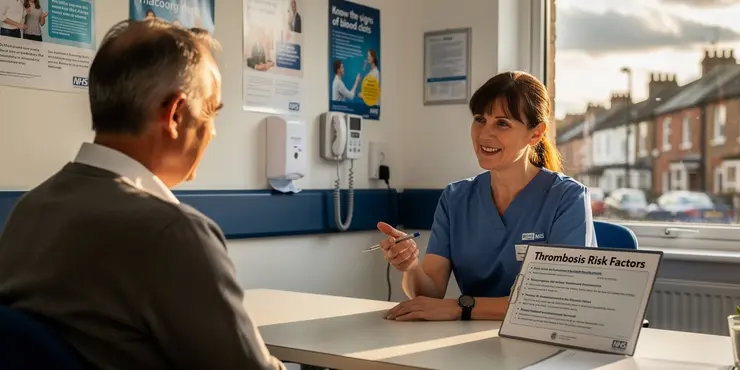
What are the risk factors for thrombosis?
Relevance: 52%
-
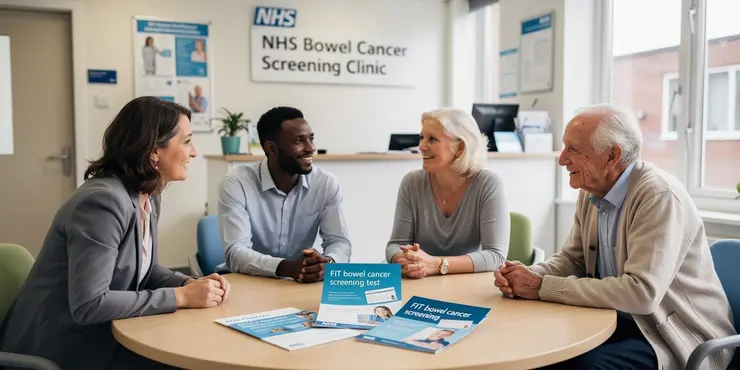
How to do the FIT bowel cancer screening test | Cancer Research UK
Relevance: 51%
-
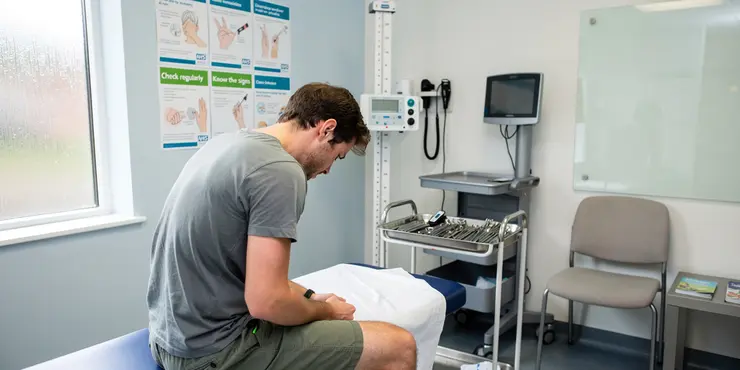
Who is at risk for testicular cancer?
Relevance: 50%
-
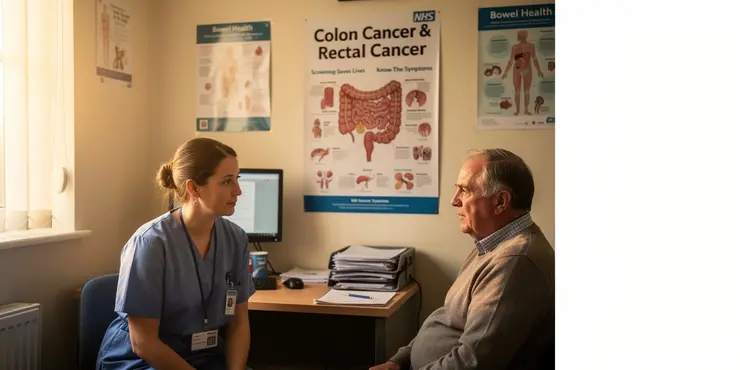
What is the difference between colon cancer and rectal cancer?
Relevance: 49%
-
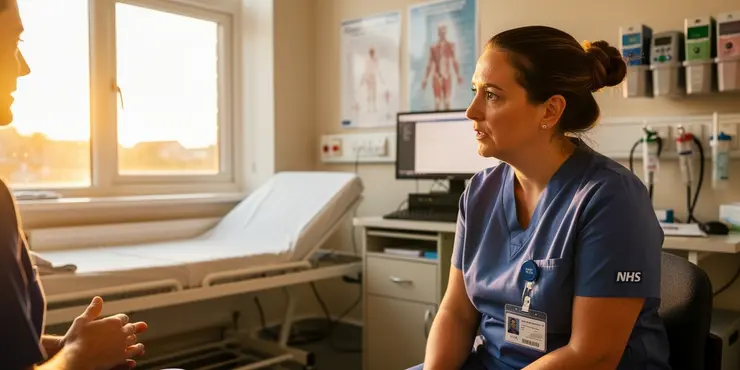
What factors determine the treatment plan for prostate cancer?
Relevance: 48%
-
Are there risks associated with home colorectal cancer tests?
Relevance: 47%
Introduction
Bowel cancer, also known as colorectal cancer, is one of the most common types of cancer in the UK. Understanding the risk factors for bowel cancer can help individuals make informed lifestyle choices and seek timely medical advice if needed. Several factors have been identified that increase the likelihood of developing bowel cancer.
Age
Age is a significant risk factor for bowel cancer. The majority of cases occur in individuals aged 50 and over. However, the incidence among younger adults has been rising, making it important for all age groups to be aware of symptoms and risk factors.
Family History
A family history of bowel cancer can increase an individual’s risk. If close relatives have had bowel cancer, especially if they were diagnosed under the age of 50, the risk may be higher. Genetic conditions such as familial adenomatous polyposis (FAP) and Lynch syndrome also increase the risk.
Dietary Factors
A diet high in red and processed meats has been linked with an increased risk of bowel cancer. Conversely, a diet rich in fiber, fruits, and vegetables can help lower the risk. The World Health Organization classifies processed meats as a carcinogen, and red meats are considered a probable carcinogen.
Physical Inactivity
Lack of physical activity is another risk factor for bowel cancer. Regular exercise can help maintain a healthy body weight and improve digestion, thereby reducing the risk of bowel cancer. It is recommended to engage in at least 150 minutes of moderate-intensity aerobic activity each week.
Body Weight
Being overweight or obese is associated with a higher risk of developing bowel cancer. Excess body weight, especially around the abdomen, can increase the chances of developing several types of cancer, including bowel cancer. Maintaining a healthy weight through a balanced diet and regular physical activity can help reduce this risk.
Alcohol and Smoking
Both alcohol consumption and smoking are important risk factors for bowel cancer. The risk increases with the amount and frequency of alcohol intake. Smoking has been linked with a higher risk of developing adenomas, which are precursors to cancer. Reducing alcohol consumption and quitting smoking can significantly decrease the risk of bowel cancer.
Medical Conditions
Certain medical conditions increase the risk of bowel cancer. Long-standing inflammatory bowel diseases such as Crohn's disease and ulcerative colitis are associated with a higher risk. Regular screening and monitoring can help manage these conditions and reduce the likelihood of cancer development.
Conclusion
While some risk factors for bowel cancer, such as age and family history, cannot be controlled, lifestyle choices like maintaining a healthy diet, regular physical activity, and avoiding substances like tobacco and excessive alcohol can reduce the risk. It is important to be aware of the symptoms and partake in regular screenings, especially for those with increased risk due to family history or medical conditions.
Introduction
Bowel cancer, or colorectal cancer, is a common cancer in the UK. Knowing what increases the risk of getting bowel cancer can help people make better choices and see a doctor if needed. Here are some things that can make bowel cancer more likely.
Age
Getting older is a big risk for bowel cancer. Most people with bowel cancer are over 50. But younger people can get it too, so everyone should know the signs and risks.
Family History
If someone in your family has had bowel cancer, you might have a higher risk. The risk is even higher if they got it before they turned 50. Some genetic conditions can also increase risk.
Dietary Factors
Eating a lot of red and processed meat can increase the risk of bowel cancer. Eating more fiber, fruits, and vegetables can help lower the risk. It's best to eat less processed and red meat.
Physical Inactivity
Not being active is a risk for bowel cancer. Exercise helps keep your weight healthy and helps with digestion. It’s good to do at least 150 minutes of exercise each week.
Body Weight
Being overweight can increase the risk of bowel cancer. Carrying extra weight around the belly is especially risky. Eating well and staying active can help keep your weight in check and reduce this risk.
Alcohol and Smoking
Drinking alcohol and smoking are risks for bowel cancer. The more you drink or smoke, the higher the risk. Cutting back on alcohol and quitting smoking can greatly lower the risk.
Medical Conditions
Some health problems can increase bowel cancer risk. Diseases like Crohn's or ulcerative colitis can be risky. Regular check-ups can help manage these conditions and prevent cancer.
Conclusion
Some risks, like age and family history, can’t be changed. But eating healthy, staying active, and avoiding smoking and too much alcohol can lower the risk. Knowing the signs of bowel cancer and getting regular check-ups are important, especially for those with higher risk.
Frequently Asked Questions
What are the common risk factors for bowel cancer?
Common risk factors include age, a family history of the disease, inherited conditions, a personal history of polyps or inflammatory bowel disease, and certain lifestyle factors.
How does age affect the risk of developing bowel cancer?
The risk of bowel cancer increases with age, with most cases occurring in people aged 50 and older.
Can family history impact the risk of bowel cancer?
Yes, having a family history of bowel cancer can increase your risk, especially if a first-degree relative was diagnosed at a young age.
What inherited conditions increase bowel cancer risk?
Conditions like familial adenomatous polyposis (FAP) and Lynch syndrome (hereditary non-polyposis colorectal cancer) increase the risk of developing bowel cancer.
Do lifestyle choices affect bowel cancer risk?
Yes, factors such as diet, physical inactivity, obesity, smoking, and heavy alcohol use can increase the risk of bowel cancer.
Does diet play a role in bowel cancer risk?
A diet high in red or processed meats and low in fiber can increase the risk of bowel cancer.
How does smoking influence the risk of bowel cancer?
Smoking is associated with an increased risk of bowel cancer, especially long-term smoking.
What is the link between alcohol consumption and bowel cancer risk?
Heavy alcohol consumption is linked to an increased risk of bowel cancer.
Can obesity increase the likelihood of bowel cancer?
Yes, being overweight or obese is a significant risk factor for developing bowel cancer.
Does physical activity influence bowel cancer risk?
Regular physical activity is associated with a lower risk of bowel cancer.
Are there any medical conditions that elevate bowel cancer risk?
Inflammatory bowel conditions like Crohn's disease and ulcerative colitis can increase the risk.
How does personal history of polyps lead to a higher bowel cancer risk?
Having adenomatous polyps increases the risk because some polyps can develop into cancer over time.
What role do genes play in bowel cancer risk?
Genetic mutations associated with inherited syndromes can increase the risk of bowel cancer.
Can bowel cancer be prevented by addressing its risk factors?
While not all cases can be prevented, many risk factors like diet, smoking, and physical activity can be managed to lower the risk.
Does diabetes increase the risk of bowel cancer?
Yes, type 2 diabetes has been linked to an increased risk of bowel cancer.
Is there a connection between sedentary lifestyle and bowel cancer risk?
A sedentary lifestyle is associated with a higher risk of bowel cancer.
Does having a previous cancer diagnosis affect bowel cancer risk?
Certain types of cancers, like ovarian or testicular cancer, may increase the risk of developing bowel cancer.
How does radiation therapy influence bowel cancer risk?
Radiation therapy to the abdomen or pelvis, especially if given for a previous cancer, can increase the risk of bowel cancer.
What is the impact of vitamin D intake on bowel cancer risk?
Some studies suggest that adequate levels of vitamin D may lower the risk, although more research is needed.
Are there specific racial or ethnic groups with higher bowel cancer risks?
Some racial and ethnic groups, such as African Americans, may have higher rates and risk of bowel cancer.
What things might make someone more likely to get bowel cancer?
Some things can make you more likely to get this disease. These are:
- Getting older
- Someone in your family had the disease
- Certain health problems you get from your parents
- Having had polyps (small growths) or bowel problems before
- The way you live, like what you eat and if you exercise
Tools like picture charts or talking to someone who knows about the disease can help you understand better.
Does getting older change the chance of getting bowel cancer?
As people get older, their chances of getting bowel cancer might go up. It's important to know this so you can stay healthy.
Here are some tips to help understand better:
- Talk to a doctor. They can help explain things clearly.
- Use pictures or drawings to see how the body works.
- Watch videos about staying healthy as you get older.
- Ask a family member or friend to help explain things.
As you get older, the chance of getting bowel cancer goes up. Most people who get bowel cancer are 50 years or older.
Can family history change the chance of getting bowel cancer?
Some families get bowel cancer more often. This can mean your chance is higher too.
If people in your family had bowel cancer, tell your doctor. They can help.
Tools and tips to help:
- Use pictures or drawings to learn more.
- Ask someone to read with you.
- Write down questions for your doctor.
Yes, if someone in your family had bowel cancer, it might make you more likely to get it too. This is especially true if a parent, brother, or sister got it when they were young.
What family health problems can make bowel cancer more likely?
Some health problems passed down in families can make bowel cancer more likely. These are:
- Family stories: If someone in your family has had bowel cancer, talk to a doctor.
- Genetic conditions: Some people are born with genes that can make bowel cancer more likely. Talk to a doctor if you think this might run in your family.
To get help, you can:
- Write down any family health stories.
- Ask a doctor for advice.
- Use pictures and simple charts to understand more.
- Watch videos made for children about health.
Some health problems, like familial adenomatous polyposis (FAP) and Lynch syndrome, can make it more likely for a person to get bowel cancer.
Can the way you live change your chances of getting bowel cancer?
Yes, some things can make it more likely to get bowel cancer.
These are:
- Eating unhealthy foods
- Not exercising much
- Being very overweight
- Smoking cigarettes
- Drinking a lot of alcohol
Using tools like pictures, simple videos, or reading with a friend can help understand this better.
Can what we eat affect the chance of getting bowel cancer?
Eating a lot of red meat or foods like bacon and sausages, and not enough fruits, vegetables, or grains can make it more likely to get a kind of cancer called bowel cancer.
How does smoking affect the chance of getting bowel cancer?
Smoking can make it more likely for a person to get bowel cancer. Bowel cancer is a disease in the stomach area where something called 'cancer' can grow and make you unwell.
It is important to know that smoking is not healthy and can hurt your body in different ways.
To help stay healthy, try not to smoke. You can also talk to a doctor or visit a health website if you want help to stop smoking.
Smoking can make it more likely to get bowel cancer. This risk is higher if someone smokes for a long time.
Does drinking alcohol make you more likely to get bowel cancer?
Drinking a lot of alcohol can make it more likely for someone to get bowel cancer.
Can being very overweight cause bowel cancer?
Yes, being too heavy or very overweight can make it more likely to get bowel cancer.
Does exercise change the chance of getting bowel cancer?
Exercise is when you move your body. It can help keep us healthy.
If we do lots of exercise, it can make our bodies stronger. This can help lower the chance of getting some illnesses, like cancer.
Bowel cancer is a sickness in the tummy area. Moving around can help to keep our insides healthy too.
It is good to play, walk, run, or do sports. These activities can help keep our bodies happy and strong.
If you need help to read, you can ask a friend or family member to help you.
You can also use tools that read text out loud for you, or highlight the words as you read.
Doing exercise often can help you have a lower chance of getting bowel cancer.
Do some health problems make bowel cancer more likely?
Illnesses such as Crohn's disease and ulcerative colitis can make it more likely.
Why do having polyps before make it more likely to get bowel cancer?
Some small growths called polyps can turn into cancer. If you have a type of polyp called 'adenomatous polyps,' it means there is a higher chance of getting cancer later.
How do genes affect the chance of getting bowel cancer?
Genes are tiny parts of our body that decide how we look and work. They come from our parents. Some genes can make us more likely to get certain illnesses, like bowel cancer.
If your family has a history of bowel cancer, it might be a good idea to talk to a doctor. They can help you understand your chances.
Using tools like picture charts or talking to someone can make this easier to understand. It is important to ask questions if you are unsure.
Changes in genes that run in families can make it more likely to get bowel cancer.
Can we stop bowel cancer by fixing things that might cause it?
We can't stop all problems, but we can do some things to help. Eating healthy food, not smoking, and moving our bodies can make problems less likely.
Can diabetes make it more likely to get bowel cancer?
Yes, having type 2 diabetes can make it more likely to get bowel cancer.
Does sitting a lot cause bowel cancer?
Not moving around a lot can make it more likely for you to get bowel cancer.
Does having cancer before change the chance of getting bowel cancer?
Some other cancers, like those in the ovaries or testicles, can make it more likely to get bowel cancer.
Does radiation therapy change the chance of getting bowel cancer?
Having radiation treatment for cancer in the belly or lower tummy can make it more likely to get bowel cancer later. This is true especially if someone had cancer before.
How does taking vitamin D affect the chance of getting bowel cancer?
Some studies say that having enough vitamin D might help you stay healthy. But we need to learn more about it.
Do some racial or ethnic groups have a higher chance of getting bowel cancer?
Bowel cancer is a type of cancer that happens in your tummy area. Some groups of people might get bowel cancer more often than others.
If you want to know your risk, it's a good idea to talk to a doctor. They can give you more information.
Using pictures or videos can help you learn more about bowel cancer. You can also ask someone you trust to help explain things to you.
Some groups of people, like African Americans, have a higher chance of getting bowel cancer.
Useful Links
This website offers general information and is not a substitute for professional advice.
Always seek guidance from qualified professionals.
If you have any medical concerns or need urgent help, contact a healthcare professional or emergency services immediately.
Some of this content was generated with AI assistance. We’ve done our best to keep it accurate, helpful, and human-friendly.
- Ergsy carfully checks the information in the videos we provide here.
- Videos shown by Youtube after a video has completed, have NOT been reviewed by ERGSY.
- To view, click the arrow in centre of video.
- Most of the videos you find here will have subtitles and/or closed captions available.
- You may need to turn these on, and choose your preferred language.
- Go to the video you'd like to watch.
- If closed captions (CC) are available, settings will be visible on the bottom right of the video player.
- To turn on Captions, click settings .
- To turn off Captions, click settings again.
More Items From Ergsy search
-

What are the risk factors for bowel cancer?
Relevance: 100%
-

What factors are contributing to the increase in bowel cancer cases?
Relevance: 80%
-

Can lifestyle changes help reduce bowel cancer risk?
Relevance: 73%
-

How does family history affect the risk of bowel cancer?
Relevance: 72%
-

What role does alcohol consumption play in bowel cancer risk?
Relevance: 72%
-

What is Bowel Cancer?
Relevance: 72%
-

What role does diet play in the risk of developing bowel cancer?
Relevance: 71%
-

What factors increase my risk of colorectal cancer?
Relevance: 71%
-

Why is there a surge in bowel cancer?
Relevance: 71%
-

What lifestyle changes can help lower the risk of bowel cancer?
Relevance: 70%
-

How common is bowel cancer?
Relevance: 69%
-

Can bowel cancer be prevented?
Relevance: 68%
-

Is diet linked to the rise in bowel cancer?
Relevance: 68%
-

How does obesity affect bowel cancer rates?
Relevance: 65%
-

What is the survival rate for bowel cancer?
Relevance: 64%
-

Bowel cancer - Symptoms and signs to look out for
Relevance: 63%
-

Are there any risk factors that increase the need for cancer screening?
Relevance: 63%
-

How is bowel cancer diagnosed?
Relevance: 63%
-

Can bowel cancer spread to other parts of the body?
Relevance: 61%
-

Are younger people being diagnosed with bowel cancer more frequently?
Relevance: 61%
-

Learn about bowel cancer (British Sign Language version)
Relevance: 60%
-

How does exercise impact bowel cancer progression?
Relevance: 60%
-

Taking a Genetic Family History - The Conversation (Bowel Cancer)
Relevance: 59%
-

What treatment options are available for bowel cancer?
Relevance: 59%
-

Can exercise help slow down the progression of bowel cancer?
Relevance: 59%
-

Are there specific benefits of exercise for bowel cancer survivors?
Relevance: 59%
-

How is the stage of bowel cancer determined?
Relevance: 58%
-

How does increased screening impact bowel cancer statistics?
Relevance: 56%
-

What are the side effects of bowel cancer treatment?
Relevance: 55%
-

Can exercise help slow down the progression of bowel cancer?
Relevance: 55%
-

Bowel Cancer
Relevance: 54%
-

Bowel cancer screening: Alan Titchmarsh and Tommy Walsh | NHS
Relevance: 54%
-

What support is available for individuals diagnosed with bowel cancer?
Relevance: 54%
-

What types of exercise are beneficial for bowel cancer patients?
Relevance: 53%
-

What are the risk factors for thrombosis?
Relevance: 52%
-

How to do the FIT bowel cancer screening test | Cancer Research UK
Relevance: 51%
-

Who is at risk for testicular cancer?
Relevance: 50%
-

What is the difference between colon cancer and rectal cancer?
Relevance: 49%
-

What factors determine the treatment plan for prostate cancer?
Relevance: 48%
-
Are there risks associated with home colorectal cancer tests?
Relevance: 47%


